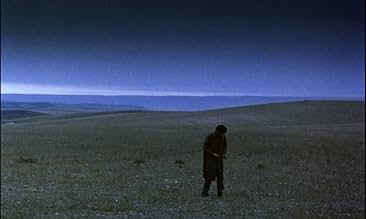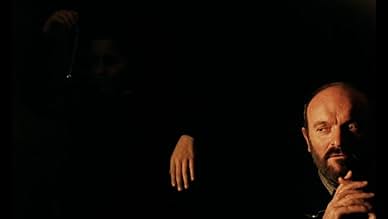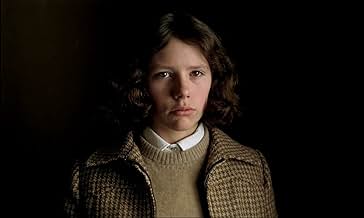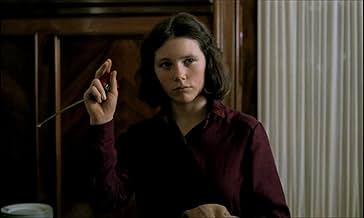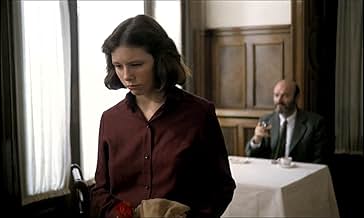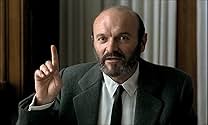CALIFICACIÓN DE IMDb
7.8/10
6.9 k
TU CALIFICACIÓN
Una mujer reflexiona sobre su relación con su padre durante su infancia, intentando comprender la profundidad de su desesperación y la verdad tras sus mitos.Una mujer reflexiona sobre su relación con su padre durante su infancia, intentando comprender la profundidad de su desesperación y la verdad tras sus mitos.Una mujer reflexiona sobre su relación con su padre durante su infancia, intentando comprender la profundidad de su desesperación y la verdad tras sus mitos.
- Dirección
- Guionistas
- Elenco
- Premios
- 7 premios ganados y 2 nominaciones en total
Aurore Clément
- Irene Ríos
- (as Aurora Clement)
- …
José Luis Fernández 'Pirri'
- Carioco
- (voz)
- (sin créditos)
José García García Morilla
- Chófer
- (sin créditos)
Chus Lampreave
- Casilda
- (sin créditos)
Jesús Nieto
- Agustín Arenas- voz
- (sin créditos)
- Director
- Guionistas
- Todo el elenco y el equipo
- Producción, taquilla y más en IMDbPro
Opiniones destacadas
This story unfolds in delicate time in the history of modern Spain, as well as during a precarious time in the life of a family.
Adolescent Estrella lives in awe of her mysterious and magical father, wonderfully played by Omero Antonutti, and weary of her ever-practical mother and of their isolated life in the misty and brooding northern countryside. Estrella's fascination with her father turns to intrigue- and then to obsession- when she discovers that her father has a secret, and realizes that she is only one facet of her father's life and not the central figure, as he is to her.
After a ray of sunshine is cast into her dark and insular life by the visit of one of her father's aunts (played by the late Rafaela Aparicio in one of her best roles), Estrella yearns to capture more of the essence of her father by one day visiting "el sur" (the south)his home territory.
As Estrella enters the awkward realm of adolescence, she grows apart from her father emotionally. A tragic turn of events condemns him to remain a mythical figure for hersomeone she wonders if she ever knew at all. The supreme irony is that she is very like him.
This film is captivating, both visually and emotionally, and the audience becomes just as absorbed in the story as the characters themselves. It is one of those films whose imagery will always stay in one's memory, such as in the my favorite scene, where father and daughter sit distantly across a table from each other in an old café, listening to the eerie sound of a "pasodoble" that wafts from a wedding in another room, bringing memories of happier, simpler days.
Adolescent Estrella lives in awe of her mysterious and magical father, wonderfully played by Omero Antonutti, and weary of her ever-practical mother and of their isolated life in the misty and brooding northern countryside. Estrella's fascination with her father turns to intrigue- and then to obsession- when she discovers that her father has a secret, and realizes that she is only one facet of her father's life and not the central figure, as he is to her.
After a ray of sunshine is cast into her dark and insular life by the visit of one of her father's aunts (played by the late Rafaela Aparicio in one of her best roles), Estrella yearns to capture more of the essence of her father by one day visiting "el sur" (the south)his home territory.
As Estrella enters the awkward realm of adolescence, she grows apart from her father emotionally. A tragic turn of events condemns him to remain a mythical figure for hersomeone she wonders if she ever knew at all. The supreme irony is that she is very like him.
This film is captivating, both visually and emotionally, and the audience becomes just as absorbed in the story as the characters themselves. It is one of those films whose imagery will always stay in one's memory, such as in the my favorite scene, where father and daughter sit distantly across a table from each other in an old café, listening to the eerie sound of a "pasodoble" that wafts from a wedding in another room, bringing memories of happier, simpler days.
Victor Erice's little masterpiece earned itself a permanent place in the repertoire of Spanish film-making. Not surprisingly: Franco was dead and Spain had bravely struggled out of a difficult transition to form a now much-respected democratic and modern nation. If art - whether literature or cinema - is to reflect that important step in a country's advance, perhaps "El Sur" (The South) is one of the four or five Spanish films of the last twenty five years which best marked that change.
Beautifully filmed in natural lighting, even in the interior of an old rural house (Ezcaray, La Rioja), the deep feelings transmitted between daughter and father reveal a delicacy so often missing in more banal entertainment. Young Sonsoles Aranguren and Icíar Bollaín play delicious roles which swing rather uncertainly from late adolescence to young womanhood as the daughter who attempts to fathom out her father (and in so doing, herself) with an extraordinarily powerful performance which obliges the intelligent viewer into the film. And Omero Antonutti plays the exact counterpart, carefully balancing his role such that he never overshadows his "daughter's" interpretation. The scenes and dialogues are enchanting, never over-acted or otherwise exaggerated; at all moments Erice maintains full control over the film's development, giving just enough touch of exquisiteness and sensitivity, allowing the film to move unhurriedly through simple but moving scenes to the predictable outcome.
Here indeed is moving theatre-cinema: the understanding spectator will leave with a certain mixture of feelings if he knows a little of Spain and its people; he will not leave unmoved, cold.
Beautifully filmed in natural lighting, even in the interior of an old rural house (Ezcaray, La Rioja), the deep feelings transmitted between daughter and father reveal a delicacy so often missing in more banal entertainment. Young Sonsoles Aranguren and Icíar Bollaín play delicious roles which swing rather uncertainly from late adolescence to young womanhood as the daughter who attempts to fathom out her father (and in so doing, herself) with an extraordinarily powerful performance which obliges the intelligent viewer into the film. And Omero Antonutti plays the exact counterpart, carefully balancing his role such that he never overshadows his "daughter's" interpretation. The scenes and dialogues are enchanting, never over-acted or otherwise exaggerated; at all moments Erice maintains full control over the film's development, giving just enough touch of exquisiteness and sensitivity, allowing the film to move unhurriedly through simple but moving scenes to the predictable outcome.
Here indeed is moving theatre-cinema: the understanding spectator will leave with a certain mixture of feelings if he knows a little of Spain and its people; he will not leave unmoved, cold.
A beautiful movie, even if I am not a Spaniard, and the historical perspective doesn't ring too much of a bell.
I would look at the movie as a relationship between a father and a daughter, and there for any father of a daughter (if both are sensitive and a bit introvert / taciturn), it would ring bells.
Father (only mentioned) and Son are on the opposite sides (of civil war, but that is not important), and the antagonism of their espoused cause permeates into their personal relation ship, and the son is thrown out/ moves out.
Wandering around for some time, he finally settles down at a remote place, opposite to his father's (north vs South, Freezing temperature Vs hot weather), with his wife and small daughter. He is the doctor in that small town, and people (and daughter), believe he has mystic powers (he might have).
There are mysteries in his life, some of which his wife knows (probably she knows most), but naturally not the young daughter (she was 8), which makes him more mysterious and interesting for her.
By accident she comes to know that there was another woman in his life (definitely before marriage), whom he had forsaken, but not forgotten. When she is again reminded (she is a starlet, and her one of the movies had been screened on the town), the longing and the memories awake. He is now in a dilemma, one side is his old flame (Irene), on the other, wife and daughter. He hovers on the edge, to abandon which side and jump on to which.
Had the movie been completed, probably I would have known some missing links - the actual story between Laura (screen pseudonym Irene Rios) and Agustin. But even without that it doesn't compromise the plot. It is just that he had been in love, got jealous (probably there was some one else too), and then got married and left the girl and the place. She could be instrumental in that as much as his father was, but that is my guess. In the movie, despite all misunderstandings, the flame burned in him, and another one was of the wife and daughter. Which one to extinguish ? It has a strong angle on the father - daughter relationship and the lack of communication in case of both being introvert - and the ill effects of such relation, especially in crisis. It has a close relationship with many - including the author of Mary Poppins (and her relation with her father). In fact, one could almost say it is P L Travers's biography. At least as much we know of it (except only probably the other woman angle).
Had the movie been completed, probably I would have known some missing links - the actual story between Laura (screen pseudonym Irene Rios) and Agustin. But even without that it doesn't compromise the plot. It is just that he had been in love, got jealous (probably there was some one else too), and then got married and left the girl and the place. She could be instrumental in that as much as his father was, but that is my guess. In the movie, despite all misunderstandings, the flame burned in him, and another one was of the wife and daughter. Which one to extinguish ? It has a strong angle on the father - daughter relationship and the lack of communication in case of both being introvert - and the ill effects of such relation, especially in crisis. It has a close relationship with many - including the author of Mary Poppins (and her relation with her father). In fact, one could almost say it is P L Travers's biography. At least as much we know of it (except only probably the other woman angle).
10ay9a
It must be almost twenty years since I saw this movie (and I saw it only once, when I was in Japan), but the memory of this movie remains in me like an old haunting dream from childhood. Cinematography at its best. I think, for the first time, this film made me think that the best media for poetry is not words, but vision.
I would want to recommend this to anyone who loves "Spirit of the Beehive" and thinks it cannot be surpassed. But alas, I don't know how you get this movie in USA with English subtitle.
I would want to recommend this to anyone who loves "Spirit of the Beehive" and thinks it cannot be surpassed. But alas, I don't know how you get this movie in USA with English subtitle.
Unless there are impenetrable barriers, most young children love their parents unconditionally, perceiving them as all knowing and all loving. Of course, with growing up often comes a realization that the parents you put on a pedestal are just human beings with flaws, some small, some big. This realization comes reluctantly to Estrella in Victor Erice's poignant 1983 film, El Sur (The South, the beautiful story of the relationship of a daughter and her father, one of only three feature films Erice made in forty years, each one a masterpiece.
Based on the novella of the same name by Adelaida Garcia Morales, the story takes place in the context of post–civil war Spain. Narrated powerfully by fifteen-year-old Estrella, the film is composed of memories and fantasies as she seeks to make sense of the painful events of her childhood. Shot by cinematographer José Luis Alcaine using only natural light, the opening conveys a feeling of an enchanted world. In the first frame, Estrella (Iciar Bollain) awakens in a darkened room with the light focusing only on her. The camera zooms to her hands as she discovers a small box under her pillow containing the pendant her father used as a divining rod.
In her memory, it is the symbol of her father's power that he once used to guess her sex by holding the pendant over her mother's stomach. In the background, we hear a dog barking and Estrella's mother (Lola Cardona) calling for her husband Agustín (Omero Antonutti), but he is nowhere to be found and Estrella knows that he is not coming back. It is only then that the camera moves to her face where a tear is visible. El Sur then flashes back seven years when eight-year-old Estrella, sensitively portrayed by Sonsoles Aranguren, and her parents have moved from the south of Spain and are traveling by train to the north where Agustin has found a job as a doctor in a local hospital.
Estrella's insights into events taking place around her are mature beyond her age. "I grew up more or less like everyone else," she says, getting used to being alone and not thinking too much about happiness." When she is older, her father, whom she idolizes, instructs her in the art of divination and she looks at it as a transfer of a supernatural gift. The slow-developing story reveals the shift in Estrella's perception both of her father and of her country. As she begins to learn more about the war that divided her family and her country, her view of the south as the mythical place depicted in postcards and movies, begins to unravel.
To Estrella, her father's life in the south has always been a mystery and she questions Milagros (Rafaela Aparicio), her father's former governess who is visiting their house, about his life. The governess tells her of the rift her father had with his own father who favored Franco in the Spanish Civil War, and how unhappy his life had been when he was growing up. Estrella's discovery of Agustin's devotion to the starlet Irene Rios (Aurore Clément) whose films played at the local theater is even more unsettling, however, as is the matter of his continuing relationship with a mysterious woman in the south.
The nature of the circumstances that are revealed in the film, however, do not prepare us sufficiently for the events that follow. Forced to curtail production before completion, Erice would have traced Estrella's journey back to the south to uncover the reality of her father's despair, but lack of funding did not permit this and the film, which Erice claims would have become much lighter in tone, was never finished. Although, because of the film's incompleteness, character motivations are murky, El Sur is still a brilliant and haunting work of art. A timeless film of symbol and myth, it was voted the sixth best Spanish film in the 1996 Spanish cinema centenary.
Based on the novella of the same name by Adelaida Garcia Morales, the story takes place in the context of post–civil war Spain. Narrated powerfully by fifteen-year-old Estrella, the film is composed of memories and fantasies as she seeks to make sense of the painful events of her childhood. Shot by cinematographer José Luis Alcaine using only natural light, the opening conveys a feeling of an enchanted world. In the first frame, Estrella (Iciar Bollain) awakens in a darkened room with the light focusing only on her. The camera zooms to her hands as she discovers a small box under her pillow containing the pendant her father used as a divining rod.
In her memory, it is the symbol of her father's power that he once used to guess her sex by holding the pendant over her mother's stomach. In the background, we hear a dog barking and Estrella's mother (Lola Cardona) calling for her husband Agustín (Omero Antonutti), but he is nowhere to be found and Estrella knows that he is not coming back. It is only then that the camera moves to her face where a tear is visible. El Sur then flashes back seven years when eight-year-old Estrella, sensitively portrayed by Sonsoles Aranguren, and her parents have moved from the south of Spain and are traveling by train to the north where Agustin has found a job as a doctor in a local hospital.
Estrella's insights into events taking place around her are mature beyond her age. "I grew up more or less like everyone else," she says, getting used to being alone and not thinking too much about happiness." When she is older, her father, whom she idolizes, instructs her in the art of divination and she looks at it as a transfer of a supernatural gift. The slow-developing story reveals the shift in Estrella's perception both of her father and of her country. As she begins to learn more about the war that divided her family and her country, her view of the south as the mythical place depicted in postcards and movies, begins to unravel.
To Estrella, her father's life in the south has always been a mystery and she questions Milagros (Rafaela Aparicio), her father's former governess who is visiting their house, about his life. The governess tells her of the rift her father had with his own father who favored Franco in the Spanish Civil War, and how unhappy his life had been when he was growing up. Estrella's discovery of Agustin's devotion to the starlet Irene Rios (Aurore Clément) whose films played at the local theater is even more unsettling, however, as is the matter of his continuing relationship with a mysterious woman in the south.
The nature of the circumstances that are revealed in the film, however, do not prepare us sufficiently for the events that follow. Forced to curtail production before completion, Erice would have traced Estrella's journey back to the south to uncover the reality of her father's despair, but lack of funding did not permit this and the film, which Erice claims would have become much lighter in tone, was never finished. Although, because of the film's incompleteness, character motivations are murky, El Sur is still a brilliant and haunting work of art. A timeless film of symbol and myth, it was voted the sixth best Spanish film in the 1996 Spanish cinema centenary.
¿Sabías que…?
- TriviaDirector Víctor Erice considers this to be an unfinished project. The original script consisted of more than 400 pages and was scheduled to be shot in 81 days. 48 days into shooting, when production was to be moved to the south of Spain, producer Elías Querejeta unexpectedly suspended the project, allegedly because of financing objections by Televisión Española, the backing television network. However, Querejeta revealed years later that he made the decision because he thought the film was complete with what they'd shot so far.
- ConexionesFeatured in Huellas de un espíritu (1998)
- Bandas sonorasLa puerta del Sagrario
Composed by Enrique Granados
Selecciones populares
Inicia sesión para calificar y agrega a la lista de videos para obtener recomendaciones personalizadas
- How long is El Sur?Con tecnología de Alexa
Detalles
- Fecha de lanzamiento
- Países de origen
- Sitio oficial
- Idioma
- También se conoce como
- El Sur
- Locaciones de filmación
- Productoras
- Ver más créditos de la compañía en IMDbPro
Taquilla
- Total a nivel mundial
- USD 22,720
Contribuir a esta página
Sugiere una edición o agrega el contenido que falta

Principales brechas de datos
By what name was El sur (1983) officially released in Canada in English?
Responda
